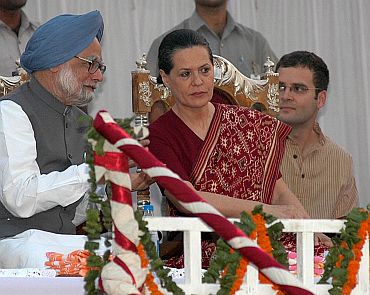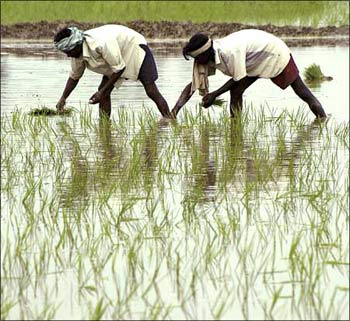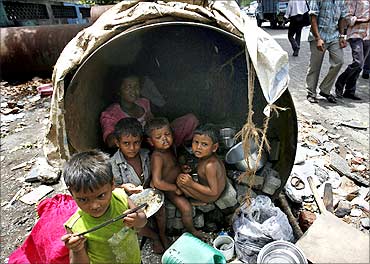 | « Back to article | Print this article |
Politicians favour the winners while the poor lose
The Gandhi mother-son duo and the prime minister have come down on two sides of the land acquisition/environment debate.
Manmohan Singh is focussed on delivering 9 per cent economic growth; he sees a choice between projects to deliver that growth, and environmentalists who want the poverty-ridden status quo.
The Gandhis see that the losers in the development game are asserting themselves; and, unlike the prime minister, they have to win elections.
Dr Singh and his growth-focussed colleagues in the government listen more to the businessmen who complain about projects being held up; their critics point to the crony capitalism that has become endemic, eroding the legitimacy of the very growth that Dr Singh is delivering.
This may be just one more facet to the old divide between Dr Singh and his aides, on the one hand, and Sonia Gandhi and the NGO cabal that populates her National Advisory Council, on the other.
Click NEXT to read on . . .
Politicians favour the winners while the poor lose
It is also possible that the curative processes of India's democracy will deliver an acceptable solution. After all, a proposal is on the cards to make industry bid for mining rights instead of getting them free, just as companies have to bid for oil and gas blocks.
Also, one state government after the other is making land acquisition feasible and fair. Haryana now offers a 33-year annuity, over and above the lump sum payment, to any farmer whose land is acquired; Mayawati is willing to copy that in Uttar Pradesh.
Solutions are quite easy, because giving expropriated farmers and tribals a fair deal is a low-cost affair. The proposed Rs 30,000 crore (Rs 300 billion) Jindal steel plant in Karnataka will get 4,500 acres of land for about Rs 540 crore (Rs 5.40 billion) -- or 1.8 per cent of project cost.
You could double the payment to farmers who will be dispossessed, and Mr Jindal would barely notice the extra squiggle on his balance sheet.
Click NEXT to read on . . .
Politicians favour the winners while the poor lose
Or, consider how little you would need to pay the 1,000 tribal families who have lost out on account of the Niyamgiri mining project -- less than Rs 10 crore (Rs 100 million) annually, if you wanted to give all of them enough money to live a better life than they have enjoyed so far.
So, why aren't more politicians and ministers speaking up for large numbers of voters who have made land and forest rights a hot-button issue? After all, the theory about free-market democracies is that, while markets create winners and losers, the function of politics is to take care of the losers -- through fiscal transfers and such.
Increasingly, though, politicians favour the winners. The Delhi airport project cost has climbed from Rs 5,900 crore (Rs 59 billion) to Rs 10,500 crore (Rs 105 billion), and now (one hears) to Rs 16,500 crore (Rs 165 billion) -- and passengers are being made to cough up!
Generosity when it comes to the well-heeled, parsimoniousness when it is the poor who ask for more. As for the environment, the civil aviation minister is willing to divert two rivers, demolish a hill and destroy mangroves to build an airport; but he won't look for alternative land next door, in Mukesh Ambani's special economic zone -- because land acquisition laws can't be used against Mr Ambani, of course.
Click NEXT to read on . . .
Politicians favour the winners while the poor lose
The fact is that India's leading parliamentarians are now plutocrats. They may speak for the aam aadmi but they party with businessmen and use their private planes, even as those agitating for Bhopal gas victims can't meet anybody in the government.
Indeed, businessmen are now politicians and vice versa (think the Maran brothers, Jagan Reddy, Karnataka's mining barons . . .). This fusion of political and financial power saw oligarchs do what they did in Yeltsin's Russia.
India is in danger of going down that road. The government can and should deliver rapid growth -- but in a manner that does not create more Maoists, or a repeat of Pakistan's '22 families'.




